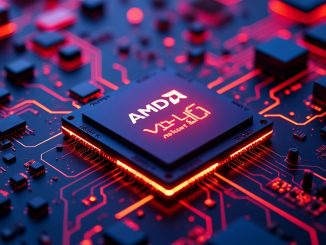- Advanced Micro Devices (AMD) shares fell 2.65% to $111.16 amid a market sell-off and news of a potential $4 billion sale of server chip plants in New Jersey and Texas to Asian firms like Compal and Pegatron.
- The plants, acquired via the $4.9 billion ZT Systems purchase in August 2024 to enhance AI data center capabilities, may be sold as early as Q2, suggesting a strategic shift under Dr. Lisa Su’s leadership.
- The divestiture could free up capital for AMD’s core design strengths, reflecting a reevaluation of manufacturing ownership in its quest to compete in the AI and cloud computing markets.

Shares of Advanced Micro Devices Inc. (AMD) dipped 2.65% to $111.16 in midday trading on Friday, mirroring a broader market sell-off while grappling with news of a potential $4 billion divestiture of server chip manufacturing plants in New Jersey and Texas. Bloomberg reports that AMD, under Dr. Lisa Su’s leadership, is negotiating with Asian firms like Compal Electronics, Inventec, Pegatron, and Wistron to offload these facilities—acquired just months ago in August 2024 through the $4.9 billion purchase of ZT Systems to enhance its AI data center capabilities. The prospective sale, which according to the report could materialize as early as Q2, includes debt and reflects a strategic pivot for AMD, possibly to streamline operations or redirect capital toward its core semiconductor design strengths amid fierce competition in the AI and cloud computing arenas.
The ZT Systems acquisition initially aimed to leverage the Secaucus-based company’s expertise in cloud infrastructure to turbocharge AMD’s AI offerings for enterprise and hyperscale clients, a move that underscored Dr. Su’s vision to rival Nvidia in the booming data center market. Yet, the quick turnaround to divest these plants suggests a reassessment of that strategy, perhaps driven by the high costs of maintaining manufacturing amid a global push for supply chain efficiency or a desire to focus on design innovation over physical production. The $4 billion valuation, including debt, hints at a deal that could preserve AMD’s financial flexibility while offloading assets that may not align with its long-term roadmap.
AMD’s stock movement reflects investor uncertainty in a volatile tech landscape, where its 2.2% midday drop aligns with market trends but also signals wariness about this shift. The company’s stronghold in CPUs and GPUs for AI workloads remains robust, yet this potential sale could indicate a pragmatic acknowledgment that owning manufacturing might dilute focus in an industry where agility and R&D reign supreme. As talks progress with Asian buyers – key players in electronics assembly – the outcome could reshape AMD’s footprint, potentially bolstering its war chest for next-gen chip development while ceding some control over the production pipeline it briefly embraced.
WallStreetPit does not provide investment advice. All rights reserved.
- Bulenox: Get 45% to 91% OFF ... Use Discount Code: UNO
- Risk Our Money Not Yours | Get 50% to 90% OFF ... Use Discount Code: MMBVBKSM
Disclaimer: This page contains affiliate links. If you choose to make a purchase after clicking a link, we may receive a commission at no additional cost to you. Thank you for your support!





Leave a Reply